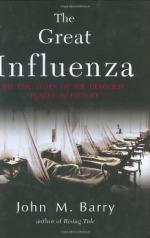|
This section contains 1,037 words (approx. 3 pages at 400 words per page) |

|
Summary
In Chapter 34, Barry describes how the scientists worked nonstop during the time of the flu epidemic. It was important to them they had always worked from well-grounded hypotheses. While they accepted less evidence than they generally would to reach a conclusion during the time of the epidemic, they prided themselves because they did not do things, like using quinine on flu victims, that went against their understanding of how the body worked. At the same time, these scientists recognized their failures. The realized they were not on the verge of conquering the flu, but they continued to work.
Hermann Biggs, New York state’s commissioner of Public Health, called for an influenza commission on Oct. 30, 1918. The group included Cole, Park, Lewis, and Rosenau along with epidemiologists and pathologists. At the first meeting, the scientists could not agree on the symptoms of the...
(read more from the Part 10: Chapters 34 - 36 Summary)
|
This section contains 1,037 words (approx. 3 pages at 400 words per page) |

|




